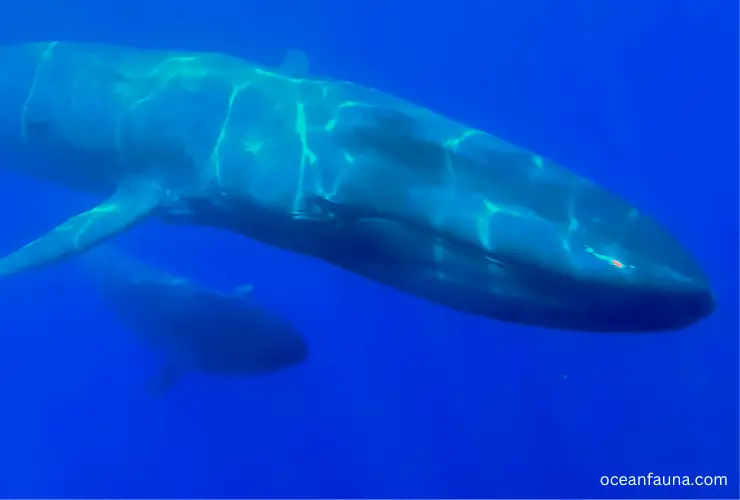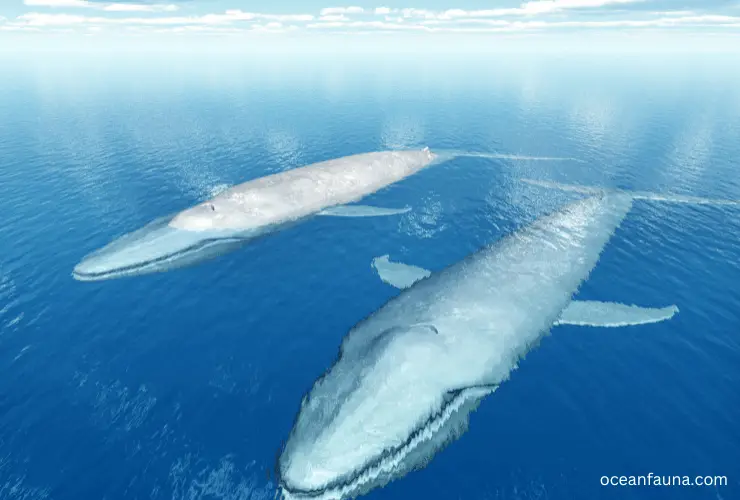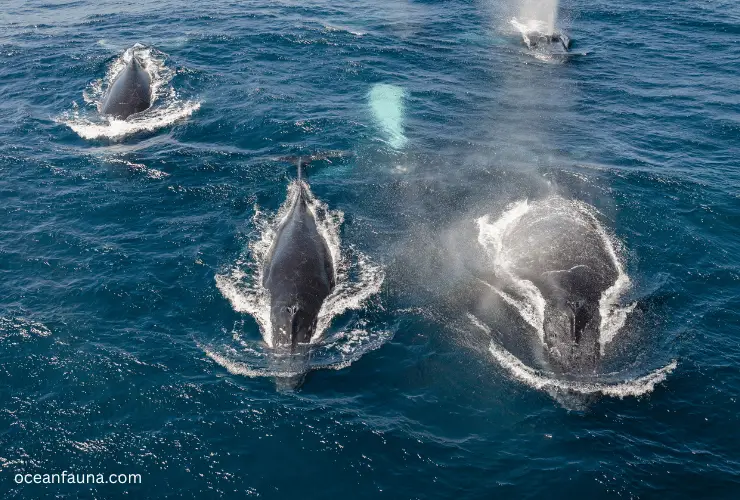Are blue whales gentle? You may think that the largest mammal, Blue Whale, might be so big and powerful that it would be dangerous. But in reality, blue whales are gentle giants who are not known to attack humans. But if they feel threatened due to humans’ presence, they may become aggressive.
This article will look more closely at blue whales’ nature and behaviour.
Are Blue Whales Gentle?
Yes, blue whales are very gentle. Based on the research conducted by scientists and observations made by observers, blue whales tend to be gentle and non-aggressive toward others.
When it comes to interacting with other whales, blue whales are mostly peaceful. They typically live in large social groups called pods, and they communicate with each other using low-frequency sound waves. While they may display some aggressive behaviour during mating season or when competing for food, even then, their aggression is usually limited to splashy displays of threats or intimidating postures that rarely escalate into physical violence.
Are Blue Whales Gentle to Humans?
Yes, blue whales are gentle to humans. Even they are also known to show inquisitive behaviour in the presence of humans and boats. Rather than being fearful or defensive of our presence, they will often move closer and observe us out of curiosity. This suggests that blue whales view humans more as an interesting distraction than a threat.
Furthermore, there have been numerous cases where curious blue whales have allowed divers to approach them without fear or aggression. In fact, some divers have reported feeling a sense of connection with the whale after having spent time with one underwater.
Are Blue Whales Friendly?
Blue whales are generally considered to be friendly. But since they are wild animals, they should always be given a wide berth. They demonstrate unique behaviours in their natural habitat and when engaging with humans, which is why it is essential to consider their limits. Although they are not typically hostile towards people, showing respect for these boundaries should be a priority.

In general, blue whales will avoid close contact with boats or people in the water, but if they do come into contact with people or vessels, it is almost always because they are curious and want a closer look.
Recent research has also shown that blue whales can form bonds with humans through vocalizations and physical contact. While these interactions often occur between researchers and domesticated ocean creatures, wild blue whales have been observed swimming close to boats and making physical contact with human beings.
It is believed that this behaviour is evidence of a relationship between man and whale built over time from mutual trust and understanding.
Although enormous animals can reach speeds up to 15 miles per hour (24 km/h) during their seasonal migrations, blue whales are still quite gentle creatures who feed solely on small shrimp-like krill.
They filter the krill out of the water using giant baleen plates in their mouths that act like sieves allowing them to feed without having to hunt or fight for food like other species of whales often do. This non-aggressive behaviour, combined with their curious nature, makes them popular visitors in many areas around the world, as observing these majestic creatures can give viewers a unique glimpse into marine life, unlike any other experience.
Why Are Blue Whales So Gentle?
Blue whales are among the most gentle and docile creatures in the ocean. Their gentle nature can be attributed to a few different factors.
Physical Attributes
Blue whales are incredibly large animals, with adults reaching lengths of around 30 meters and weights of around 200 metric tons. Because of their size, blue whales are intimidating and can easily overpower any other animal, including humans.
This makes them less likely to provoke confrontation or seek out aggressiveness when interacting with unfamiliar animals or people.
Dietary Preferences
In addition, blue whales eat a largely vegetarian diet made up primarily of krill and plankton, which are harvested from the depths of the ocean. This means that they have no reason to come near the shore or interact with land-based animals or people since they do not need to hunt for food.
Additionally, since their diets consist mostly of non-mammalian prey species such as krill and fish, there is very little chance that a blue whale will try to consume a person since it would not recognize them as potential prey.
Evolutionary History
Finally, blue whales have been around for millions of years, and over this time, they have evolved into gentle giants who generally prefer peaceful coexistence over confrontation. They have learned through evolution that cooperation is more beneficial than aggression in terms of survival, so they tend to avoid aggressive behaviour even when presented with challenging situations.
In comparison to other marine mammals, such as orcas which actively hunt for seals, and cetaceans, which hunt for fish, blue whales are far less likely to actively pursue aggression in pursuit of food or territorial disputes due to their long evolutionary history as primarily gentle creatures.
Can You Swim with A Blue Whale?
Swimming with a blue whale is possible, but it is not something that should be done without the guidance of an experienced guide. As I said before, blue whales are the largest mammal on Earth. Because they are so large and powerful, swimming with them can be dangerous if not done properly.

Remember that blue whales are wild animals and cannot be controlled or predicted. Even if a swimmer follows proper safety protocols and stays a respectful distance away from the whale, there is still no guarantee of how the animal will react.
Blue whales live in all oceans worldwide, but swimmers are more likely to encounter them in areas where krill, their main food source, is abundant. Some of the best places for swimming with blue whales include Sri Lanka, Australia’s east coast, Antarctica, New Zealand’s south island, and Baja California in Mexico. In these areas, there are often experienced guides who can help ensure a safe swim.
When swimming with a blue whale, keep in mind that these animals face threats from human activities such as commercial fishing and climate change. So respect their space in terms of physical space and noise pollution.
Loud noises can harm their echolocation abilities, which they use for hunting food, so avoiding using any type of motorized vessel or making loud noises while near them is recommended.
Additionally, many countries have regulations that must be followed when interacting with marine life; always make sure you know what rules apply before you set out on your adventure!
How To Know Blue Whales Are Disturbed?
Here are five signs that will show blue whales are disturbed. If you notice any of them, it’s better to stay away from them.
- Changes in Behaviour: One of the most obvious signs of a disturbed blue whale is a change in its normal behaviour patterns. This can include a decrease in social activity, a reduction in feeding, or an increase in aggressive behaviour.
- Aggression: Blue whales are typically peaceful creatures, but if they are disturbed, they may become more aggressive. This can be seen in the form of charging boats, slapping the water with their tail, or even lunging at boats or other marine animals.
- Changes in Swimming Pattern: If a blue whale is feeling disturbed, it may also display changes in its swimming pattern. This can include a sudden increase or decrease in speed or a change in direction.
- Surface Behaviours: Surface behaviours can also indicate if a blue whale is disturbed. This can include a sudden change in the frequency or duration of breaching, spy-hopping, or obtaining.
- Vocalizations: Blue whales communicate through a series of vocalizations, including singing and whistling. If a blue whale is disturbed, it may increase the frequency or volume of its vocalizations or produce new vocalizations that are not typically heard.
What If a Blue Whale Shallows a Human?
First of all, you are not a considerable prey for blue whales. Even they can be a good friend to humans. But if a blue whale somehow shallows a human, the person will likely suffer a cruel and painful death.
The immense pressure of the whale’s throat muscles would compress their body, squeezing the air from their lungs and potentially crushing any fragile bones. Furthermore, the stomach’s acidic environment can cause severe burns to exposed skin.

The unfortunate human would then have to endure the process of digestion. As blue whales feed on small organisms like fish, krill, squid, and plankton, their stomachs are filled with gastric juices, which contain powerful digestive enzymes like pepsin and hydrochloric acid. These enzymes break down proteins in order to make them easier to absorb by the whale’s intestines.
Therefore, if a human were swallowed whole, they would be broken down by these same enzymes before being absorbed into the bloodstream and eventually used as energy or eliminated as waste.
This takes time, so it’s likely that if someone was swallowed whole by a blue whale, they wouldn’t die right away. Instead, they might stay alive for a while before dying a painful death from the digestive process or something else, like hunger or dehydration. You should try to avoid this situation at all costs since the result is not good.
Conclusion
Hopefully, you have a compact knowledge that although blue whale is the largest animal, they are one of the ocean’s most peaceful, gentle, and friendly creatures. Even they are safe to swim with. But depending upon the mood, sharks may change their behaviour. In such cases, it is better to keep a distance from them. Otherwise, your life may be endangered.


5 thoughts on “Are Blue Whales Gentle? [Whales’ Behaviour]”